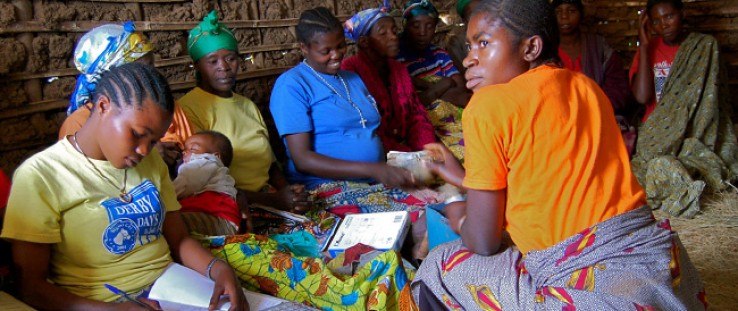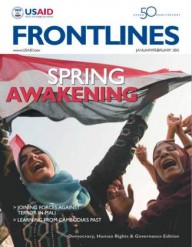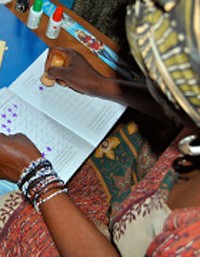 A member of a village savings and loan association in Kalulu, Kabare, signs for a loan of 20,000 Congolese francs (around $22). With this money, she will walk five hours down to the market in Bukavu to buy corn flour and sell it in local market.
Daniela Greco, IRC
A member of a village savings and loan association in Kalulu, Kabare, signs for a loan of 20,000 Congolese francs (around $22). With this money, she will walk five hours down to the market in Bukavu to buy corn flour and sell it in local market.
Daniela Greco, IRC
 A member of a village savings and loan association in Kalulu, Kabare, signs for a loan of 20,000 Congolese francs (around $22). With this money, she will walk five hours down to the market in Bukavu to buy corn flour and sell it in local market.
Daniela Greco, IRC
A member of a village savings and loan association in Kalulu, Kabare, signs for a loan of 20,000 Congolese francs (around $22). With this money, she will walk five hours down to the market in Bukavu to buy corn flour and sell it in local market.
Daniela Greco, IRC
The secretary of a village savings and loan association in Madaka, Walungu, registers the shares bought by a member. Each star represents a share saved by the member, for a value of 500 Congolese francs ($0.55). Members meet every week and can buy up to five shares per meeting.
For more than two decades, armed rebel groups have perpetrated innumerable acts of violence against women in eastern Democratic Republic of Congo (DRC), including rape, sexual assault, and abductions. The women who survive these brutal attacks face complex mental health problems such as trauma, shame, fear, feelings of abandonment, and even the desire to die. This distress takes a heavy toll, making it difficult for women to perform essential daily tasks, participate meaningfully in family and community activities, and earn a living.
Often, these women are shunned by their communities, further compounding their mental-health issues and creating or compounding economic ones. Those who do seek mental-health treatment frequently find such services lacking.
All this is beginning to change.
As part of an effort to help female survivors of sexual violence in developing countries worldwide, USAID is assisting women in the South Kivu province of eastern DRC with a combination of psychological and economic support. The goal is to identify well-tested methods of helping women that can be used in other regions to address a variety of challenges. The project helps survivors to cope more effectively by thinking of the violent event in a different way, and provides them with a way to earn money and reconnect with their communities—a two-pronged response in a country suffering from the challenges of poverty and gender-based violence.
USAID, along with the World Bank, is supporting the work of the Applied Mental Health Research (AMHR) Group at the Johns Hopkins Bloomberg School of Public Health, the International Rescue Committee (IRC), and local organizations in South Kivu province.
“The combined efforts of these organizations build on case management and basic psychosocial support—essential services that are challenging to establish in contexts as complex as eastern Congo—and take service provision to the next level by adding additional options for survivors to heal and recover,” says Dalita Cetinoglu, director of the International Rescue Committee’s gender-based violence program in the Democratic Republic of Congo.
The mental-health intervention now being offered by the organizations was selected specifically in response to concerns expressed by community-based psychosocial assistants (PSAs) who were working directly with the women. The assistants understood that many of their clients needed more effective assistance than they were providing.
Two Conditions, Two Programs
Case management services, which form the basis of support to survivors, is a process where a social worker assesses the needs of the client (and the client’s family when appropriate), and coordinates, monitors, and evaluates a package of services to meet the client’s needs.
Instead of settling on basic case management, staff members from the IRC and Johns Hopkins trained local interviewers to assess the needs of survivors of sexual violence in three communities in South Kivu. The interviewers reported that survivors faced not only mental-health issues, but also poverty, lack of access to medicine, and insufficient food resources. The stigmatization, rejection, and alienation of the women contributed to their poverty, creating a self-reinforcing downward spiral.
These findings led to developing and testing something called group cognitive processing therapy (CPT-G) and village savings and loan associations (VSLAs)—two distinct interventions to address the women’s psychosocial and economic needs.
In 2011, the IRC and Johns Hopkins University introduced CPT-G, a mental health intervention that allows service providers to address the specific effects of trauma otherwise not addressed through case management and basic psychosocial support alone.
Cognitive processing therapy has been shown to not only be an effective treatment of post-traumatic stress, such as in a USAID-funded program in northern Iraq, but has also been shown specifically to reduce symptoms in survivors of sexual trauma.
During the treatment, groups of six to eight women participate in 12 weekly sessions. The women learn skills that help them begin to change the way they think about their trauma and the associated feelings of fear or shame they may experience. Eventually, they begin to think about and cope with the event in a less debilitating way.
For the social economic program, VSLAs—where members of a community pool money from which they can take out small-interest loans and can eventually divest with interest—was selected based on prior USAID-funded IRC experience and evaluation in Burundi.
Measuring Impact
The current IRC-JHU collaboration has different communities of women participating in CPT-G or VSLA to evaluate the impact of each of these interventions on the mental health and functioning of sexual-violence survivors. Therapy participants will also be invited to form savings-and-loan groups after they have completed their 12-week sessions. According to Hopkins researchers, this will show whether the women’s improved mental health and functioning will help them take advantage of the economic opportunities presented by the loan program.
The evaluation program also includes control groups of women waiting to receive either the mental health or social-economic services. The JHU research team noted that they need groups of comparison women who are not receiving services in order to determine whether any changes seen among participants are due to the programs themselves. All women in the control groups will receive treatment or access to the saving and loans programs following their waiting period.
To date, seven psychosocial workers in South Kivu have been trained in how to run cognitive processing therapy groups. A total of 141 survivors of sexual violence have completed their sessions, representing nearly 90 percent of those enrolled. The IRC staff is now conducting follow-up assessments with the women.
Additionally, more than 150 women in groups of 15 to 25 are currently participating in village savings-and-loan associations in South Kivu. The women contribute their own savings to a joint fund. They can then apply to take out loans that they later pay back to the group with interest.
“What really matters for us is that, thanks to our VSLA, we have access to money and that this money has an impact on our households, particularly on nutrition and on access to school for our children,” said a member of a VSLA in the territory of Walungu.
“In the past, we didn’t know what saving was, we were not informed,” said another woman from the same association. “Today, I can take a credit of 10,000 Congolese francs (around $11). I sell lenga-lenga (a local variety of spinach) and I have a benefit of $2.20 per week, half for me, half to pay back the interests to the group at the end of the month. With this money I’m able to feed my children.”
At the end of approximately a one-year cycle, members cash out, receiving their initial investment plus any accumulated interest. Through participation in such a group, women not only earn money and have access to small loans for microenterprise, but they also interact with other women—only some of whom are survivors themselves—and take part in a community of shared trust and support.
“Our husbands are happy. Since we gathered together as a group, we share our problems and receive good advice from other members,” said a beneficiary. “This improved the communication in our families.”
From Feeling “Worthless” to “Useful”
Although the implementers are still evaluating the success of this program, the South Kivu psychosocial assistants and their supervisors report large decreases in symptoms of depression among the women participating in the CPT therapy sessions. The PSAs also describe feeling a sense of personal empowerment from being able to help women in their communities.
Related Content
Participants, many of whom originally reported feelings of blame and guilt about being raped, are now acknowledging that what happened to them is not their fault. One PSA said that for women in her group, “most of them said in the beginning that they were worthless, but now at the end of therapy they are saying they are very useful to the society. One woman said her in-laws want her to come and help with a family member who is sick. Before, they treated her as if she was worthless because of the rape, but now that they need her help, it means she is important and worthy.”
These PSAs are also seeing changes in the abused women’s families and communities. One explained that “initially women said they could no longer participate in community activities because they felt that no one would listen to a raped woman, but now [PSAs] notice that women are joining groups like the choir, farming groups, prayer groups, and other community groups, and report that they are speaking up and are being listened to.”
Another PSA noted that “women also reported that [initially] they did not believe the therapy will work, but out of desperation they give it a shot. But, now at the end of CPT, they can truly say it is magic.” The women in some areas are already organizing to continue meeting as a group, despite the conclusion of the 12-week program.
USAID expects preliminary results from the two-pronged effort in the first half of 2012, and complete results in 2013.
The results of the evaluation, in addition to the feedback of the PSAs, IRC staff, and the women themselves, will increase understanding of what can be done to help women survivors of sexual violence. This understanding will, in turn, enable USAID and its partners to provide women in other regions with much-needed assistance.
Judith Bass and Sarah McIvor Murray are with the Johns Hopkins Bloomberg School of Public Health; Karin Wachter is with the IRC.
Other Efforts in DRC
The IRC/Johns Hopkins project is part of USAID’s larger efforts to address sexual and gender-based violence (SGBV) in DRC, where over 57,000 vulnerable individuals and nearly 20,000 SGBV survivors received specialized support services as a result of USAID programs in fiscal year 2010 alone. More than 7,000 service providers and 300 Congolese service-delivery organizations improved their ability to deliver high-quality services to SGBV survivors, abandoned children, and their families. And 1,450 separated or abandoned children—many of whom are survivors of sexual abuse—were reunited with their families.
USAID has also provided technical assistance in drafting critical legislation and subsequent prosecutions in SGBV cases in the country. USAID efforts to promote awareness of the 2006 Law against Sexual and Gender-Based Violence led to an increase in surveyed population awareness from 21 percent to over 66 percent in South Kivu province.
USAID also works with civil society organizations to improve gender perceptions and empower vulnerable populations. The Agency has provided technical assistance to over 100 national human rights organizations on how to successfully plan and manage projects, raise community awareness of human rights and SGBV, and monitor courts and judicial processes.










Comment
Make a general inquiry or suggest an improvement.